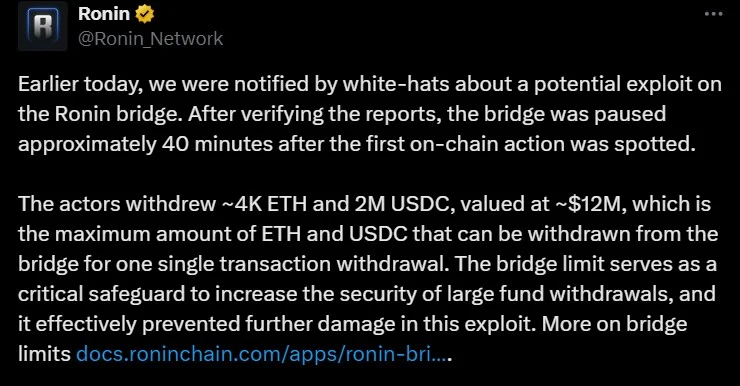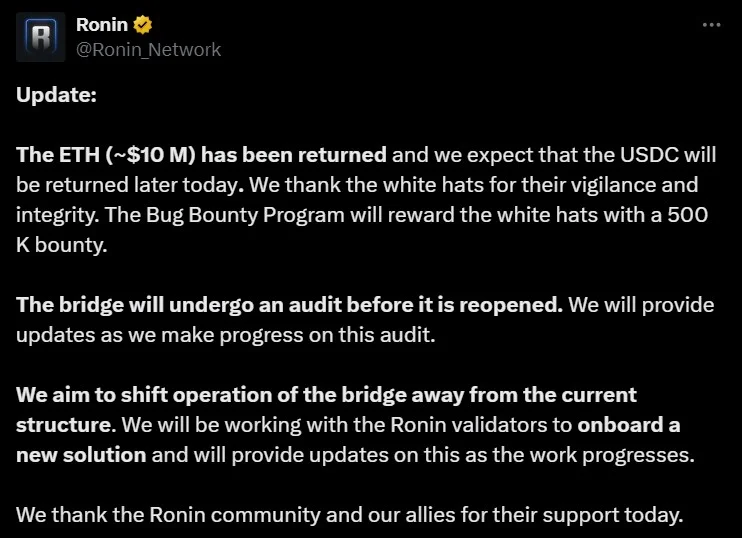Ronin Network Hack Averted: $12 Million Saved

Ronin Network narrowly escapes a $12 million crypto heist thanks to ethical hackers who discovered and exploited a vulnerability before malicious actors could strike.
Krishna Murthy August 8, 2024 Cybersecurity News, Firewall Daily, Vulnerabilities

Illustration of how a public network communicates with a private network and local device using the 0.0.0.0 address. Source: Oligo
Share on LinkedInShare on Twitter
Ronin Network, the blockchain powering the popular play-to-earn game Axie Infinity, dodged a major security bullet on August 6, 2024. Ethical hackers, also known as white hats, discovered and exploited a vulnerability in the Ronin bridge, a system that allows users to transfer assets between the Ronin blockchain and other blockchains.
The white hats, acting more like security researchers in this instance, withdrew $12 million worth of cryptocurrency (4,000 ETH and 2 million USDC) during their demonstration of the exploit. This amount represents the maximum that can be withdrawn in a single transaction, highlighting a critical safeguard that potentially prevented a much larger theft.
Responsible Disclosure by White Hats, Swift Response
Commendably, the white hats informed the Ronin Network about the exploit concurrently with their demonstration. After verifying the information, the Ronin team promptly paused the bridge for 40 minutes to mitigate further damage.


Source: XA detailed post-mortem analysis from Ronin is expected next week, but initial investigations indicate a recent bridge update deployed through a governance process as the culprit. This update inadvertently introduced a security flaw.
The flaw caused the bridge to misinterpret the number of votes required from bridge operators to authorize withdrawals. This error allowed unauthorized actors to potentially perform disruptive actions.
Lessons Learned and Moving Forward
The Ronin Network team stated that it is actively working on a permanent solution. The fix will undergo rigorous audits before being implemented by bridge operators. This multi-step approach aims to prevent similar incidents from happening again.
The bridge will remain offline for further security checks before reopening. Additionally, the Ronin Network announced plans to abandon the current bridge architecture in favor of a new solution developed collaboratively with Ronin validators, entities responsible for securing the network.
Meanwhile, in a move that is likely to be applauded by the security community, the white hats have returned all stolen funds. They will also receive a substantial bug bounty of $500,000 for their “forced audit,” highlighting the importance of ethical hacking in identifying and addressing vulnerabilities.


Source: X
Ronin had previously assured users that even if the hackers did not return the stolen funds, user holdings were guaranteed, and any losses would be reimbursed.
Unanswered Questions and Historical Context
There are still some unanswered questions surrounding the incident. It remains unclear whether the white hats exploited the vulnerability before notifying Ronin or if they discovered it during their test. Additionally, it’s uncertain if they demanded a bug bounty before returning the funds.
This incident is not the first time the Ronin bridge has been compromised. In March 2022, the bridge suffered a devastating hack, resulting in the theft of a staggering $625 million worth of cryptocurrency – the largest crypto heist recorded at that time. The attack was attributed to the notorious North Korean hacker group Lazarus Group, known for employing social engineering tactics such as fake job interviews to gain initial access to target systems.
Unlike the recent incident, the funds stolen in the 2022 attack were not returned by the hackers. However, law enforcement agencies managed to recover $30 million in September 2022 and an additional $5.8 million in February 2023.
Importance of Ethical Hacking and Proactive Security Measures
The Ronin Network incident serves as a stark reminder of the ever-present cybersecurity threats lurking in the digital world, particularly within the rapidly evolving blockchain space. The responsible actions of the white hats in this instance potentially prevented a much larger financial catastrophe.
This event highlights the crucial role ethical hackers play in identifying and addressing vulnerabilities before malicious actors can exploit them. Furthermore, it underscores the importance of implementing robust security measures and conducting thorough audits throughout the development process. By prioritizing proactive security measures, blockchain platforms like Ronin can create a safer and more secure environment for users.





